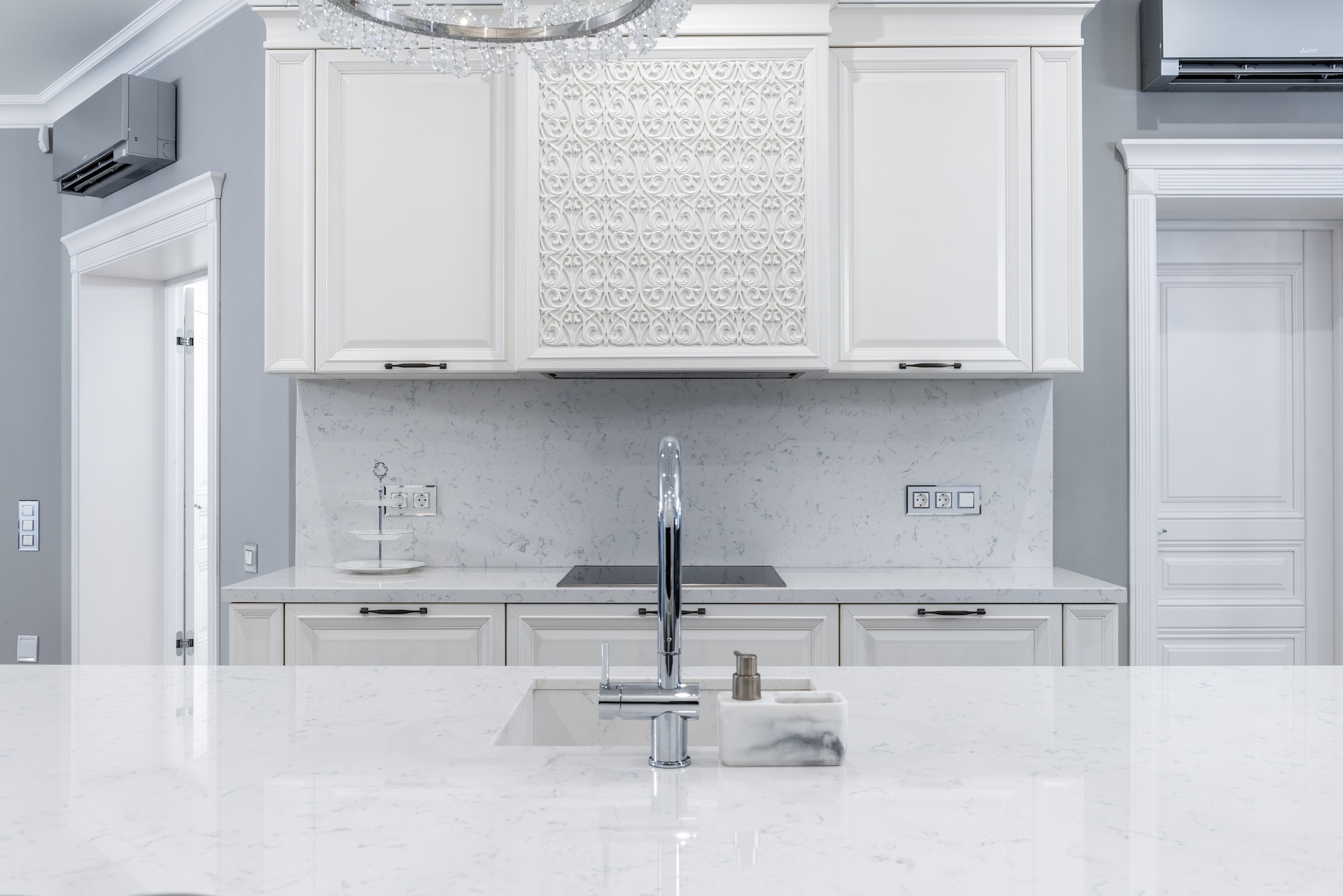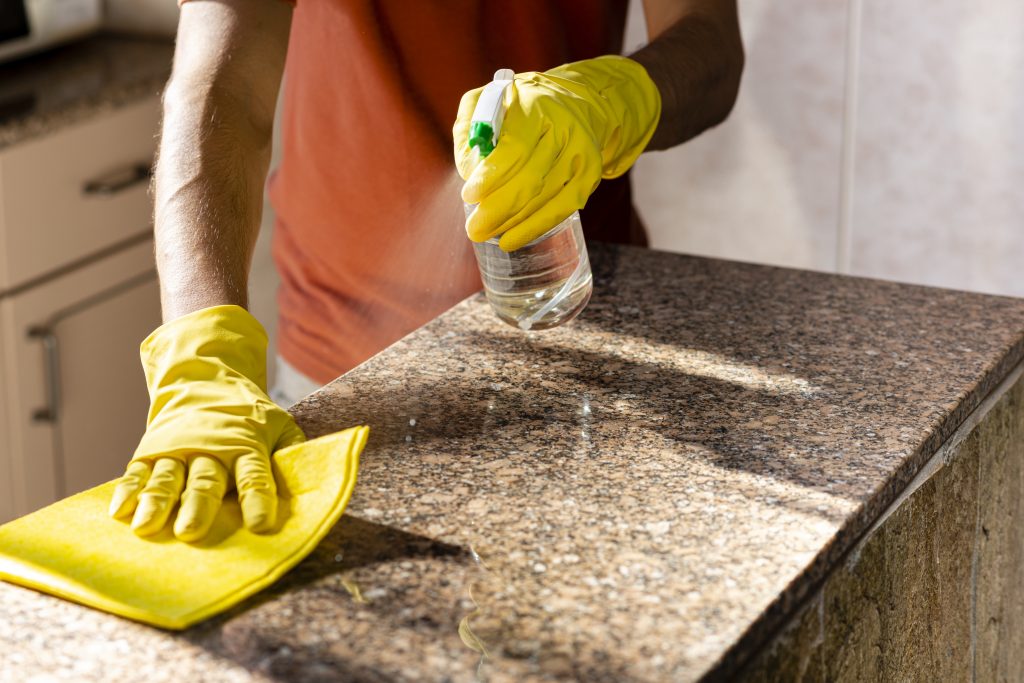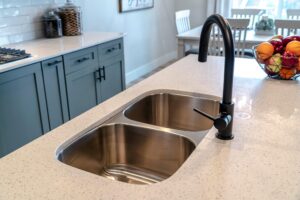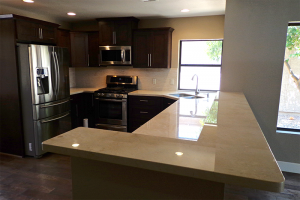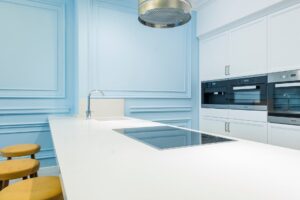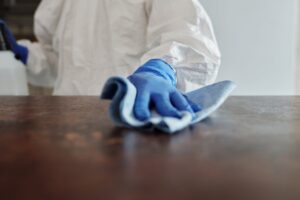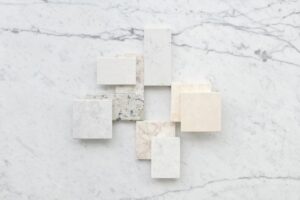- Should you seal granite countertops before using them?
-
Care and Maintenance of Your Granite
-
Avoid These Mistakes on Your Beautiful Granite Countertops
- 1. Using a Granite Countertop While Working with Raw Meat
- 2. Storing items with an acidic pH level on your granite countertop
- 3. Allowing Any Spills to Remain on a Granite Work Surface
- 4. Using Knives In direct contact with the granite
- 5. Placing Hot Pans Directly on Your Worksurface
- 6. Whether you’re Lounging or Working on Your Granite Countertop
- 7. Bathing Your Children in the Undermount Kitchen Sink You Have in Your Home
- 8. Putting Weighty Objects Down on the granite
- Granite Slabs as Work Surfaces the Good and the Bad
-
Avoid These Mistakes on Your Beautiful Granite Countertops
To begin with, the most important thing is that “true granite” is a type of igneous rock primarily composed of quartz and feldspar minerals. “Granite” is a trademarked term. Granite is characterized by its distinctively speckled appearance, which is caused by combining several different materials. As a result of this mix, granite can have various finishes. This includes creamy white, deep black, speckled gray, and even bright blue and salmon pink.
What details should you consider when choosing a granite slab for your counter using a stone? Make sure that you choose one whose appearance appeals to you. It is an obvious point to make. The most significant part of this decision is aesthetics. No matter what top you decide to put in, you’ll have to learn to live with it and take care of it. You should pick the piece of the slab that appeals to you the most when selecting granite for your kitchen or bathroom. Take your time because some granite slabs have more movement, also known as a natural pattern.
Should you seal granite countertops before using them?
You absolutely should. Granite should be sealed to prevent staining or etching like any other natural stone. Marble and limestone are very porous, whereas quartz is not a porous stone’s susceptibility to staining increases in direct proportion to the porosity of the stone. You can think of granite as falling somewhere in the middle. Sealing it regularly will help prevent stains from becoming embedded in it.
What are granite countertops’ most effective maintenance practices to ensure their continued beauty?
Even though most granite is simple to clean, be warned that particular granite countertops, particularly those that do not have a sealant, can become stained and absorb harmful bacteria. Investing in a clean explicitly designed for granite is recommended. However, if you cannot locate one, any pH-neutral soap will work just fine for daily cleaning. It is essential to avoid using cleaners that contain an excessive amount of chemicals or vinegar. It is because these substances have the potential to remove the protective sealant that was added during the manufacturing process.
What Not to Use on Granite Countertops
If you already have these cleansers in your home, you may be tempted to use them occasionally. This is especially true considering that you may only sometimes notice the damage you are doing to your stone immediately. If this is the case, you should avoid using them. The unfortunate reality is that even a single application of any alkaline or acidic substance to the surface of your granite will cause damage that you cannot repair.
It is because both acids and alkaline remove the more fragile stone particle closer to the surface. Etching is the process that is used to create a dull spot in a stone after the weaker particles of the rock are removed through the process of etching. It can occur even on honed stone surfaces. However, it will be much more noticeable on surfaces with a polished or glossy finish.
If you have an etched countertop, the only way to fix it is to have it ground down and refinished. This is a process that is both expensive and inconvenient. On the other hand, etching is easy to avoid, mainly if you keep your stone sealed and always use only PH-neutral cleaners.
Care and Maintenance of Your Granite
Because you can only use standard cleaning products on your granite, what can you use instead? You can clean your granite of approximately 90% of the surface dirt and debris using only water and a towel made of microfiber. When you need to wipe something down or take care of most of your day-to-day cleaning needs, water and a towel made of microfiber are all you need.
Utilizing the appropriate cleaning products is an excellent first step toward preserving the pristine condition of your countertops. However, there are a few additional easy steps that you need to take before moving on.
The first thing to remember is always to clean up spills as soon as possible. Even if you spill tomato sauce on granite, it will not immediately cause the stone to become damaged. Damage to your stone will occur gradually unless it is exposed to something extremely corrosive, such as battery acid.
While preparing food, keep a damp sponge or cloth close at hand. This is so you can clean up any spills as they occur.
The sealing of your granite should be the next step. The application of granite sealer to your stone serves the same purpose as wax does for the protection of the finish on your vehicle. On the surface of the countertop, it will produce a thin invisible barrier to the naked eye, preventing liquids and stains from penetrating the surface.
A significant number of people need to carry out this necessary step. However, most of the time, when people end up with a stain on their countertop, it is because they did not properly seal the surface and allowed the spill to sit there overnight.
Avoid These Mistakes on Your Beautiful Granite Countertops
Granite is one of the hardest igneous rocks, which means it was formed deep within the earth. As a result, you might believe that you could get away with just about anything on your granite countertops. However, this is different. Granite is indeed more scratch-resistant than nails, but that’s not the only thing you need to be concerned about.
If you are familiar with the correct cleaning procedures and what should not be placed on granite countertops, you will help the countertops last longer. If you want your granite countertops to remain in good condition, you should steer clear of the following eight activities:
1. Using a Granite Countertop While Working with Raw Meat
Even though granite that has been adequately sealed should prevent bacteria from getting into the microscopic crevices of a countertop, do you want to take the risk of salmonella contamination by playing cross-contamination roulette?
The meat itself won’t cause any harm to the granite. But the residue left behind could be hazardous to your health if it winds up on another food item. Additionally, after working with things such as raw meat, people frequently need to clean the surface they use to prepare food by using strong disinfectants, which are not appropriate for granite countertops.
The sealant can become dull and damaged, and the granite itself may become discolored if you use certain cleaners commonly found in grocery stores. Use only a cutting board, followed up with soapy water and a clean cloth made of microfiber.
2. Storing items with an acidic pH level on your granite countertop
The surface of your countertops can be etched by acidic substances. It makes it easier for stains to penetrate and set in. Take caution around the following household items that contain acid and have the potential to erode the seal on your granite:
- Vinegar Citrus fruits
- Soft drinks
- Perfume/Lotions
- Polish for the nails Soaps
In the bathroom, store your personal care items in a cabinet or basket with a stable base designed to prevent leakage in the event of an accident. In addition, whenever you prepare food in the kitchen, you should always use cutting boards and place your drinks on coasters.
3. Allowing Any Spills to Remain on a Granite Work Surface
Even if you take all the necessary precautions, there is still a chance that something oily or acidic will splash all over the countertop. It would be best if you quickly cleaned the area using a detergent recommended for sensitive skin or warm soapy water.
If you let a spill sit for an extended period, it may etch the seal and leave a stain on the granite.
4. Using Knives In direct contact with the granite
Granite is a hard stone that can withstand a knife’s blade without damage. However, scratches may develop over time on your countertops, making the stone look older and more worn. In addition, your knives will be disappointed that you did not use a cutting board. Cutting food with utensils that have been sliced across granite will quickly dull and damage the blades of the knives. A dull knife poses a greater risk of injury than one that is sharp because it is more likely to cause cuts by accident. By using a cutting board, you can keep your family safe and save the environment in the kitchen risk-free.
5. Placing Hot Pans Directly on Your Worksurface
Can you set hot pans on granite? Even though granite is sturdy enough to withstand the heat of a hot pan without melting or cracking, it is still a good idea to put a barrier between the two in case of any accidents.
Since granite is an igneous rock, it can withstand intense heat. Your countertops are safe to use even if they come into brief contact with a hot pot.
However, prolonged exposure to high heat can prevent the sealants from becoming less effective. Bonds are essential for preventing stains and other forms of damage to the surface they are applied. When you’re in the kitchen, keep trivets and potholders close to protect your countertops from any heat that may be generated.
6. Whether you’re Lounging or Working on Your Granite Countertop
Granite is a natural rock characterized by stunning striations or veins and fascinating fissures. However, these striations are susceptible to cracking an excessive force is applied. Therefore, if you need to reach something, change the light bulbs, paint, or any other item, do not climb or stand on the countertops.
Utilize a stable stool or step ladder; doing so will ensure your safety.
7. Bathing Your Children in the Undermount Kitchen Sink You Have in Your Home
Even though an under-mount sink is fastened firmly to the bottom of the granite countertops, the sink’s mounting could become loose if used in the kitchen to wash a child. If there are spaces between the granite and your sink, water may be able to seep through. It aids in fostering the growth of mold and causing damage to the cabinet below. Be sure to keep the seal around your under-mount sink intact so it can remain securely fastened to the countertop.
Even though bathing your child in the sink makes for a great photo op, you should use the actual bathtub so you don’t damage any of your kitchen’s surfaces.
8. Putting Weighty Objects Down on the granite
Even though granite is rugged and durable, it is possible to chip or scratch the surface of your countertop if you drop something heavy on it. The cutout and edges of the area close to the sink are particularly susceptible to damage from an impact.
Storing heavy cookware and other large items in lower cabinets reduces the likelihood of damaging your countertops. When lowering an item from a higher cabinet, you have a greater risk of dropping it than picking it up from a lower wardrobe. When moving heavy items onto your granite countertops, do so cautiously and slowly to preserve their pristine appearance.
Granite Slabs as Work Surfaces the Good and the Bad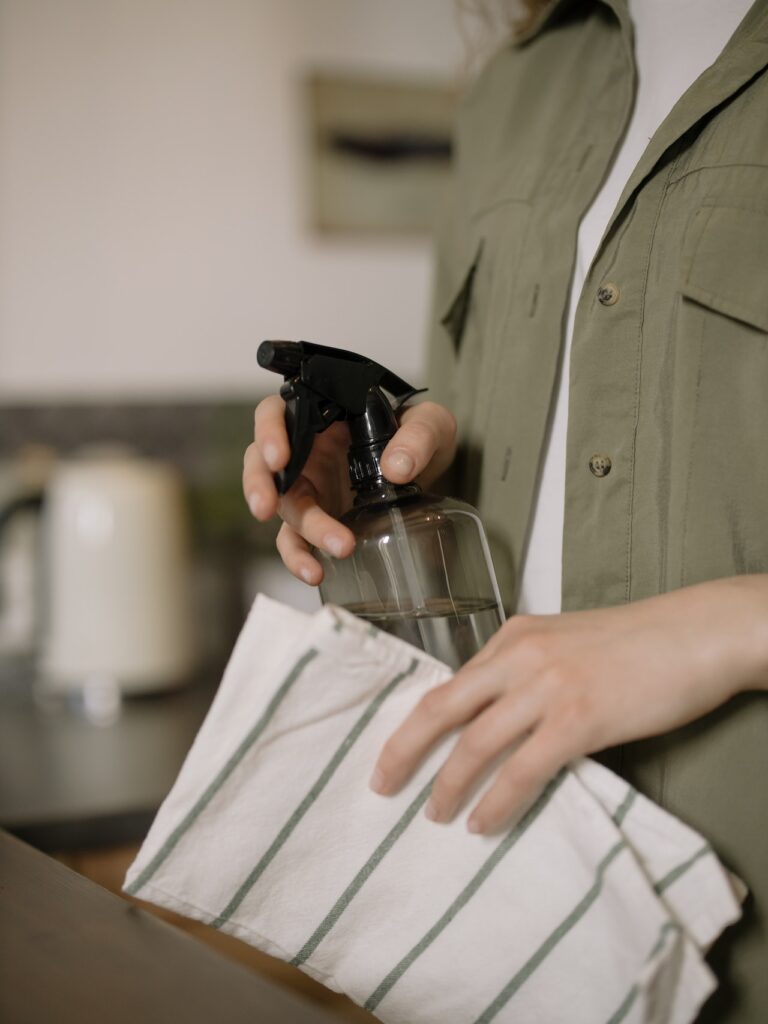
Granite is the material of choice for the ideal countertop because it combines durability and aesthetic appeal in a single material. You will be able to take pleasure in the beauty of your granite countertops for the rest of your life if you take the time to care for them properly. If you follow these correct cleaning procedures, your granite will retain its gleaming appearance even after years of use.
Here is what you need to do:
- Utilize cleaning products that have been formulated specifically for stone.
- It would be best if you placed coasters beneath cups and wine glasses.
- It is essential to use trivets and placemats when serving hot dishes.
- Immediately after a spill, use sponges and soft cloths to blot up the excess liquid.
- Underneath products that have the potential to leak, use trays, bins, and baskets.
What you really ought not to do:
- When you clean, use harsh chemicals like bleach, ammonia, or cleaners explicitly made for the bathroom.
- You can use vinegar to clean the granite countertops in your home.
- Make use of abrasive soft scrubs or cleaners with gritty particles.
- Use abrasive pads or metal scrubbers like steel wool to clean the surface.
- You should store liquid products that can leak on your countertop.

